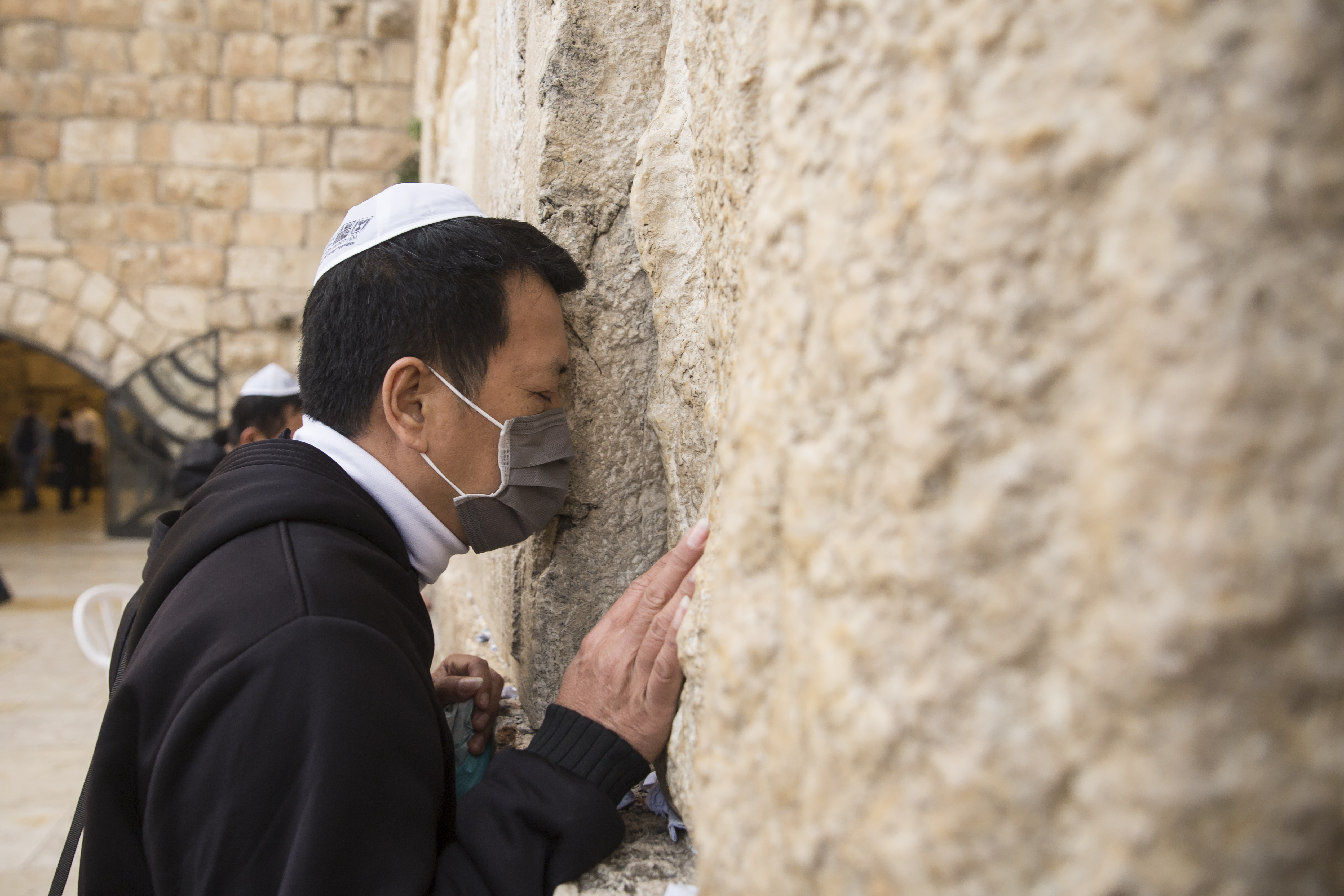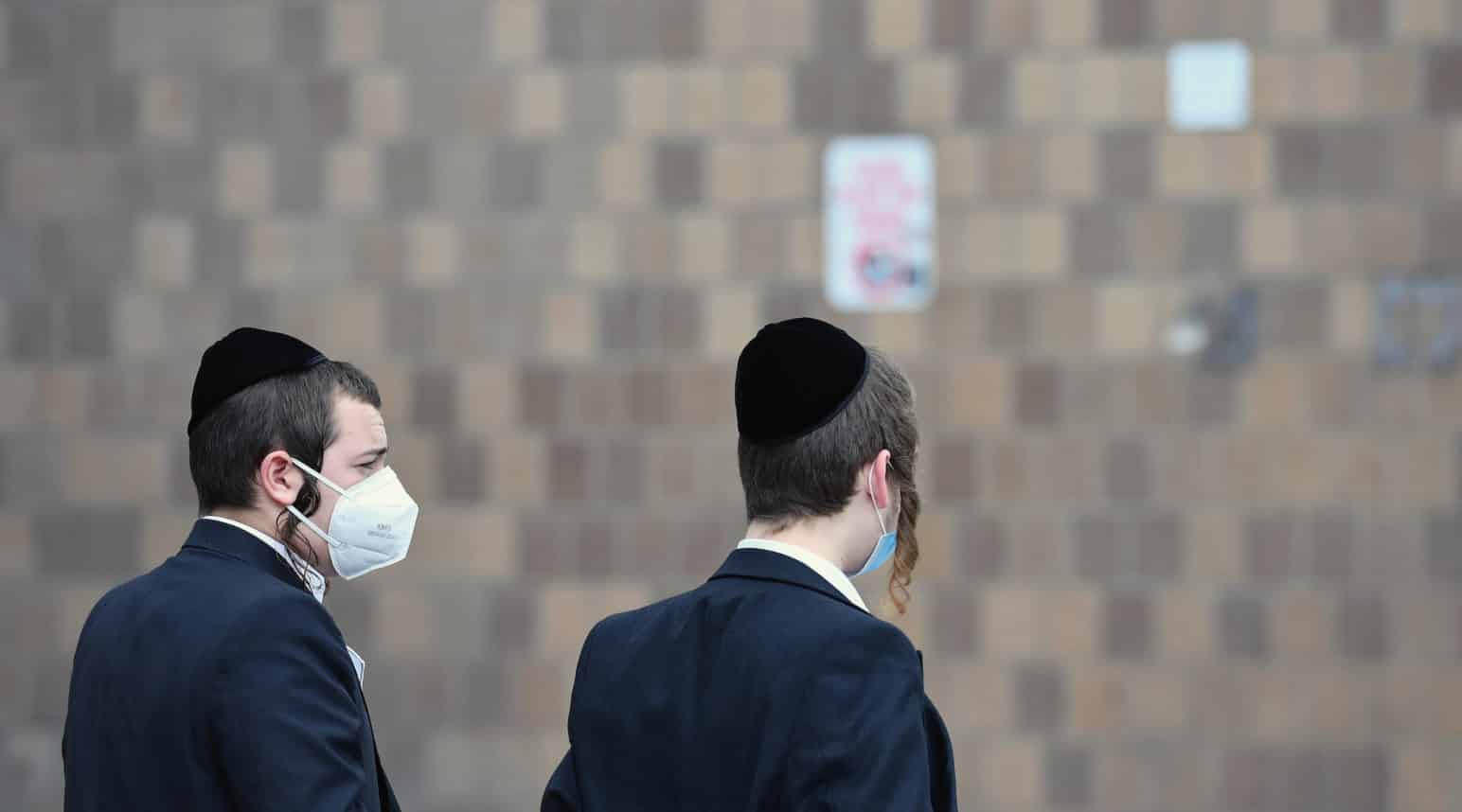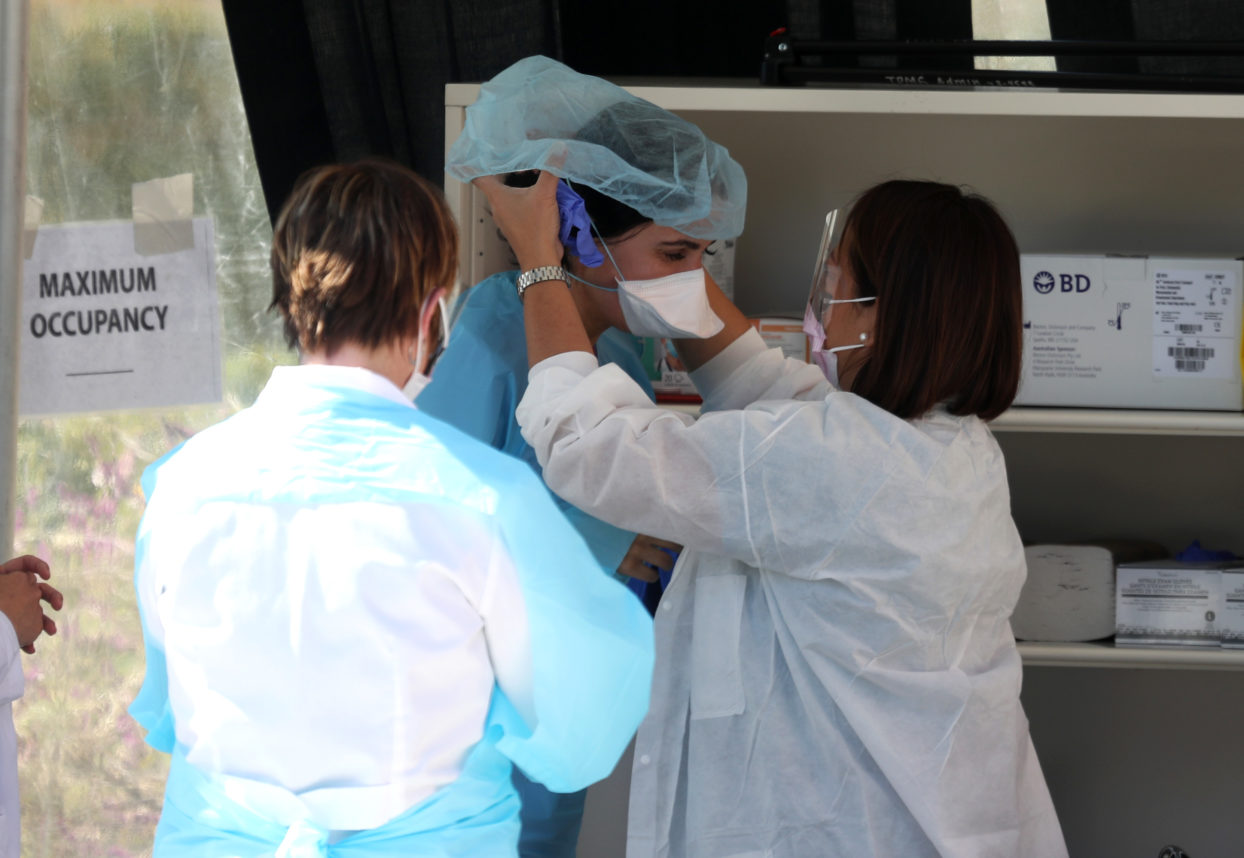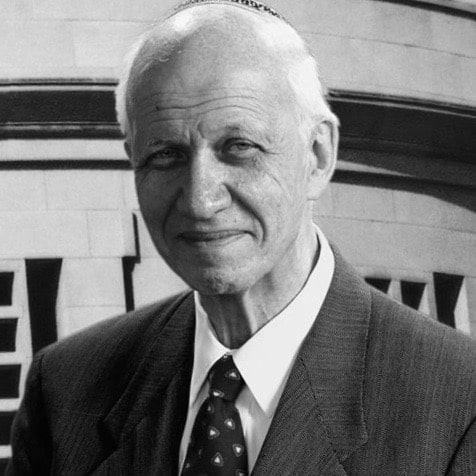 A man wearing a face mask prays during a mass prayer at the Western Wall for coronavirus patients in Jerusalem’s Old City on February 16, 2020 in Jerusalem, Israel. A Chief rabbi called for Israelis to gather at the Western Wall, on Sunday, to pray for those infected with the coronavirus. (Photo by Amir Levy/Getty Images)
A man wearing a face mask prays during a mass prayer at the Western Wall for coronavirus patients in Jerusalem’s Old City on February 16, 2020 in Jerusalem, Israel. A Chief rabbi called for Israelis to gather at the Western Wall, on Sunday, to pray for those infected with the coronavirus. (Photo by Amir Levy/Getty Images) Jewish religion teaches that life is the most precious element in existence. Life itself is grounded in God, the source of life, who sustains it lovingly at all times. Accordingly, our planet is structured to favor life. Out of love, God seeks to fill the world with life. “The world was not created to be void; it was brought into being to be settled, filled with life.” (Isaiah 45:18). The goal of religion – all religions – is to recruit humanity to join in partnership with God to increase life in the world.
More dramatically, Judaism promises that if we go all out in this partnership, we can repair this mortal, flawed world. We can turn the planet into a paradise, full of life, where all forms of life are upheld in their fullest dignity and value. In such a world, all human lives will be treated as being of infinite value and the elderly will receive special honor and care. In the Biblical vision, if we persist, we can achieve the triumph of life over all its enemies – poverty, hunger, oppression, war, sickness – even death itself. In our times, the messianic promises have become more credible, thanks to breakthroughs in every field of science, medicine, industry and agriculture. Human life expectancy has more than doubled in the past two centuries.
Judaism promises that if we go all out in this partnership, we can repair this mortal, flawed world.
Now comes the coronavirus plague which directly assaults and undercuts every one of these teachings. This enemy of life is relentless and cruel and especially targets the elderly and the medically vulnerable. The pandemic means that a mass killer is on the loose. And the planet is presently structured to enable its spread and to overwhelm the medical, healing systems. Unless we go all out, we are threatened with a decisive victory for death over life. That would make a mockery of our dreams.
How shall we respond? The Torah tells us to see ourselves as soldiers in the army of life, on permanent duty against death. The first priority now is to fight this escalating threat. That means investing in the forty or more projects, worldwide, exploring a vaccine and treatments for the COVID-19 disease. Then as the pandemic shrinks, we permanently increase our underwriting of the medical research, health and hospital systems which we have neglected for decades.
We need to reorganize our daily behaviors as a matter of life and death. Life is fragile so we have to tend to it in every behavior. The Jewish tradition has long taught that there is a constant struggle between life and death. Every behavior presents us with the choice of being on the side of life or of death. That is why there are laws of Kashrut (eating), laws of work and rest, laws of speech. The next food we eat can be healthful or it can move us toward excessive sugar, overweight, or even occlusion of the heart. The water we drink, the air we breathe is life-sustaining – or we can pollute them and harm our health and others’. The next word we utter can be a word of affirmation, consolation, inspiration to live – or it can demolish someone’s dignity, or diminish the quality of life for ourselves and for others. Judaism’s core commandment is to “choose life” (Deuteronomy 30:19) – to structure every behavior on the side of life.
Restructuring our behaviors for life is the needed response to the coronavirus. This entails washing our hands repeatedly, rigorously not shaking hands, trying not to touch our face with our hands, sneezing into tissues, getting adequate sleep – and social distancing, even from family and friends. Kissing, hugging – these were once our most expressive acts of love. In this moment, we hold people closest to our hearts by keeping six feet away. These are religious responsibilities, i.e. binding, whether or not the authorities will punish us or other humans will know. Between God and us, every action is known. Therefore we hold ourselves to the highest standards.

Out of the realization that we are all at risk, we must choose life for all by connecting together. This leads us to look around for the isolated and most vulnerable and communicate our care. We run errands for those in need. We reach out to our day laborers and gig workers and help tide them over this crash. We promise ourselves that in the future, we will strike a better balance between needs of the self and being part of the circle of humanity. Now we experience that our closest communities sustain us in crisis, as in expansive times. They uphold us in our collective journey toward a repaired world.
There is a midrash that the Messiah will be born on Tisha B’av. This reflects the Jewish teaching that when forces of cruelty, destruction or oppression become dominant, there is a ‘choose life’ response – that is to increase kindness, upbuilding and redemptive activity. On the very day of the greatest destruction of our history before the 20th century, the midrash suggests that the response Jewry will give is to generate the ultimate redemption. It is no coincidence that in the generation of our greatest catastrophe and death, the Holocaust, the Jewish people responded with the creation of the State of Israel and the greatest outburst of life, creation and mutual responsibility of our history. At this moment of fear, enforced isolation and shutting down – and despite the shocking economic setback – our philanthropic and community leadership should respond with a life-affirming outpouring of faith, caring and giving. And since “the human does not live by bread alone”, this should include underwriting education, learning and culture.

Going forward, there are lessons to be learned. There is serious evidence that this pathogen was unleashed because people ate endangered species. The trade-in eating wildlife which funneled COVID-19 into human society (and before that, the SARS and MERS viruses) should have been stopped long ago – because it was endangering those species’ survival. Going forward, we need to address the economic, medical and environmental impact of the food we are producing. This includes a review of to what extent the domesticated and safer animals we are eating – thanks to industrial farming and husbandry – also fail the test of choosing life. To what extent are they produced by tormenting other living creatures and overstressing the environment?
Religious authorities acted irresponsibly and failed to block transmission. Instead, they allowed or encouraged worshippers to come together in crowds.
We have learned that the disease spread because a dictatorial system, unwilling to admit a flaw, suppressed the truth, silencing the needed early warning. Elsewhere, religious authorities acted irresponsibly and failed to block transmission. Instead, they allowed or encouraged worshippers to come together in crowds. They failed to understand that the God of Life wants humans to live and prioritizes that goal ahead of worship that puts the faithful at risk. Furthermore, religious teachings that invoke God as a magic talisman against real-life threats desecrate the name of God. Those authorities that display know nothing attitudes toward science or proper medical procedures are gross violators of the instruction “Keep my laws and commandments which humans shall do and live by them.” (Leviticus 18:4) This pandemic teaches us that political freedom and scientific research, academic integrity and freedom of speech literally make the difference between life and death.
To stop the panic we have to remind ourselves that we are one generation, a link in the partnership chain of civilization that has brought humanity this far toward a repaired world. Humanity has undergone huge setbacks in the past – both in demographics and in economics. Yet, by closing ranks and helping each other, we have come back from the worst catastrophes to higher levels of well being afterwards.
How do we put the disease in perspective? How do we – especially the elderly but also the young – regain calm and face down the threat of death?
Believers should allow themselves to accept the loving comfort: “I (God) am with him in his trouble.”(Psalms 91:15): We are not alone. God is with us, holding our hand, upholding us. “Though I walk in the valley of the shadow of death, I am not afraid of evil for You are with me.” (Psalms 23:4). Whether we are formally religious or not, there is another consideration. When we chose life and brought love and purpose into our lives, we understood that we had taken on more vulnerability and risk than if we remained self-centered. Then, as now, the right response to increased danger is not to yield to fear or despair. Rather, we increase life so deeply and constructively that it is worth living, whatever our fate.
Rabbi Yitz Greenberg is President of the J.J. Greenberg Institute for the Advancement of Jewish Life and author of “The Triumph of Life” (forthcoming) from which this article is derived.























 More news and opinions than at a Shabbat dinner, right in your inbox.
More news and opinions than at a Shabbat dinner, right in your inbox.